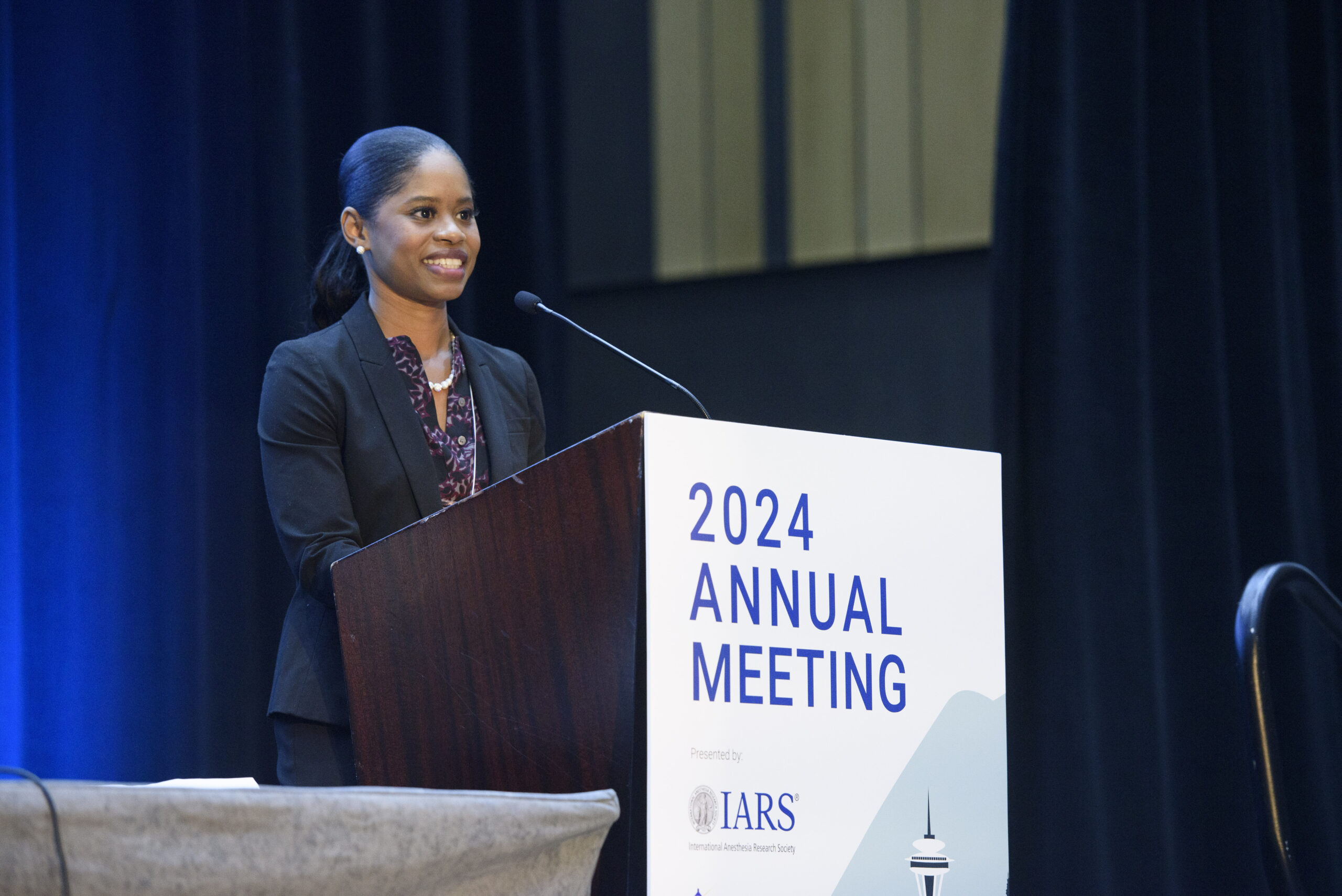Kosaka Top Basic Science Abstract Recipient Interview: Varina Clark Onwunyi, MD
In Vivo miR10b-5p Inhibition in Rats is a Novel Therapeutic Strategy for Pulmonary Hypertension
 Varina Clark Onwunyi, MD
Varina Clark Onwunyi, MD
Resident Physician
UCLA
Los Angeles, CA
Abstract Presentation:
Kosaka Best Abstract Awards Session, Sunday, May 19, 2024, 7:00 am – 8:30 am PT
As a resident physician at UCLA, Varina Clark Onwunyi, MD, was attracted to a career as an anesthesiology physician-scientist for its potential to lead perioperative, acute and chronic pain, and critical care teams. Through her anesthesiology residency, she has been fortunate enough to explore dynamic, multifaceted roles of the anesthesiologist while gaining an understanding of the essence of providing compassionate, comprehensive care to patients. In her current research with the Umar and Eghbali research labs at UCLA, Dr. Clark Onwunyi has made inroads to discovering future therapies to help patients suffering from pulmonary hypertension (PH) and right ventricular (RV) failure, an interplay that is currently understudied. Using in vivo models, they were able to identify that upregulation of specific micro-RNAs in lungs of preclinical rat models may rescue pre-existing PH. They plan to continue to expand this investigation, “In Vivo miR10b-5p Inhibition in Rats is a Novel Therapeutic Strategy for Pulmonary Hypertension,” extrapolate pathways and identify molecular targets that may serve as therapies to treat PH and cardiovascular disease. In recognition of this forward-looking research, she was given the Kosaka Top Basic Science Abstract Award during the Kosaka Best Abstract Awards Session on Sunday, May 19 at the 2024 Annual Meeting, presented by IARS and SOCCA. In the following interview, Dr. Clark Onwunyi shares her research path, how this award encourages her to dedicate a portion of her residency training and future career to scientific inquiry and robust translational research and her hopes for the future.
1. For this research, I am…
An investigator and resident trainee
2. What drew you to the anesthesiology specialty?
Anesthesiologists are leaders of the perioperative, acute and chronic pain, and critical care teams. During anesthesiology residency, I have been able to explore these dynamic, multifaceted roles while understanding the essence of providing compassionate, comprehensive care to patients. My commitment to serve through clinical care, education, advocacy and research continues to shape my future career as an anesthesiologist and physician-scientist.
3. What drew you to this area of research?
Pulmonary hypertension (PH) is a fatal disease associated with pulmonary vascular remodeling that leads to right ventricular (RV) failure and death. Despite advanced procedures and current therapies for patients suffering with PH, the prognosis is poor. Using in vivo models, we investigated the dynamic relationships between PH, pulmonary fibrosis, and RV function. While the interplay between PH and RV failure remains understudied, I am hopeful that our work will lead to future therapies for our patients.
4. What are the goals you most want to accomplish in your work with this research project?
We have identified that upregulation of specific micro-RNAs in lungs of preclinical rat models may rescue pre-existing PH. Using our preclinical models, we will further extrapolate pathways and identify molecular targets that may serve as therapies to treat PH and cardiovascular disease.
5. What is the potential impact of your research on the field of anesthesia and patient care?
Currently, there are no definitive treatments for PH, and we are hopeful that our work will contribute to the development of experimental agents that may serve as novel therapeutic targets.
6. What are the benefits of presenting your research during abstract sessions at the IARS Annual Meeting?
It is such a special and unique opportunity to engage in provocative discussions addressing the clinical conditions of our patients and to learn about ongoing research to improve patient outcomes. The scientific insights shared after presenting my research have already helped me to refine my future work. Furthermore, my interactions with colleagues, mentors, esteemed physicians, and bright scientists at the annual meeting was astounding. These opportunities help to push forward my research exploration and develop new connections within the field.
7. How do you feel about receiving the Kosaka Best Abstract Award?
I am honored to receive such a prestigious award. While balancing motherhood, clinical training, and basic science research, it is such a humbling recognition amongst such brilliant change agents in the field.
8. How will this award affect your research and professional trajectory?
This award has inspired me to continue to dedicate a portion of my residency training and future career to scientific inquiry and robust translational research.
9. Is there anyone else you wish to acknowledge as part of this research team?
I am grateful for the mentorship provided by Soban Umar, MD, PhD, and others as I continue to develop my future career as a physician-scientist. I would also like to acknowledge the members of the Umar and Eghbali research labs at UCLA who were vital to the successful execution of this research project.
10. Outside of your research, what might someone be surprised to learn about you?
I love to dance! Dance has always been an important aspect of my life and helps to keep me grounded and creative!
“It is such a special and unique opportunity to engage in provocative discussions addressing the clinical conditions of our patients and to learn about ongoing research to improve patient outcomes. The scientific insights shared after presenting my research have already helped me to refine my future work. Furthermore, my interactions with colleagues, mentors, esteemed physicians, and bright scientists at the annual meeting was astounding. These opportunities help to push forward my research exploration and develop new connections within the field.”
– Varina Clark Onwunyi, MD, Kosaka Top Basic Science Abstract Recipient
International Anesthesia Research Society
